Why the Patek Philippe Nautilus is King: A Collector Weighs In
by Perry Heim
I’ve had the idea for this piece in mind for quite some time now, but as always when I think of writing something I inevitably ask myself, “What’s the point?”
Well, after reading article after article discussing the virtues of Patek Philippe’s Nautilus – such articles seem to be popping up exponentially – it became clear to me that none state a self-evident truth that appears obvious to me. So I decided to give it a go.
Here is what I find so appealing about the Patek Philippe Nautilus Reference 5711.
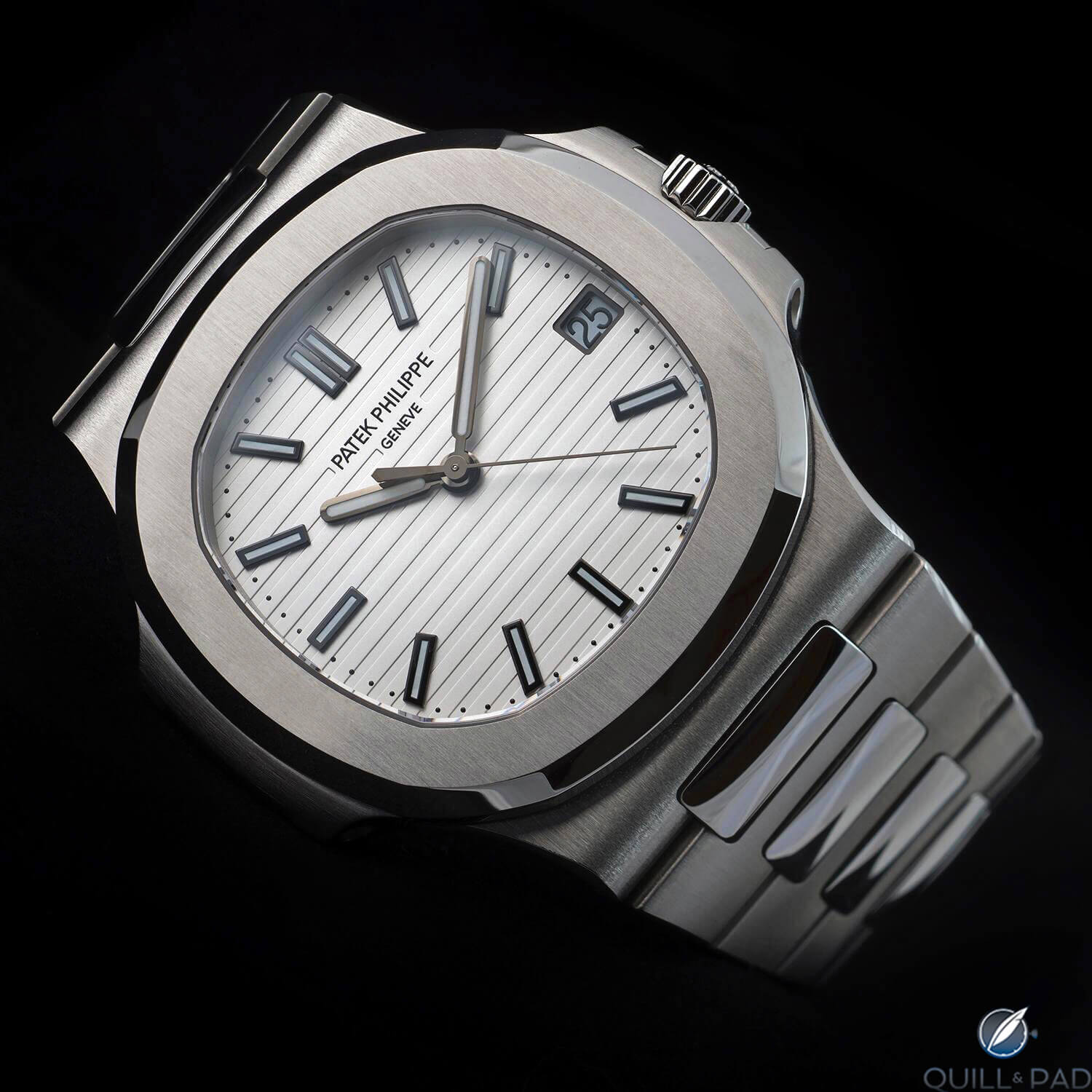
Patek Philippe Nautilus Reference 5711A (photograph courtesy GaryG)
Water resistance and a thin case
What I find most remarkable about the design of the Patek Philippe Nautilus Reference 5711 is that it offers 120 meters of water resistance within a case merely 8.3 mm high. You may ask, “What of it?”
* It should be noted that Patek Philippe has downgraded the current Nautilus to just 30-meter water resistance.
In my humble opinion, the two most important factors when evaluating a luxury sports watch are elegance (hence, luxury) and durability (hence, sports). And while the following might err on the side of reductionism, I believe these two can be quantified quite easily using just two parameters: water resistance as a signifier of durability and case thickness as a measure of elegance.
Granted, there is more to luxury than elegance, and there is more to elegance than a thin case (the same going, of course, for sports, durability, and water resistance), so some may disagree with the significance of these two.
I do have more criteria. Being a watch enthusiast for several years, I have developed a specific ideal for my everyday watch. You know the watch I’m talking about: the beach-to-boardroom-go-anywhere do-anything kind of watch.
My ideal everyday watch has to be mechanical (automatic or manual winding, both fine by me) with an exhibition case back, some degree of luminescence, no thicker than 10 mm, and with a water resistance equal to or greater than 10 atm (100 m).
As we shall see, finding the conjuncture of these last two is challenging within the confines of a single watch.
Not-so-competitive landscape
I will now demonstrate that this is a feat unmatched by any other watch, save Patek Philippe’s own 5167 Aquanaut, which manages to fit the same movement in an 8.1 mm thick case while retaining said water resistance.
Does this mean the 5167 is superlative to the 5711? Of course not; originality, design, and heritage are but a few of the additional factors at play here.

Tom Holland at the Wimbledon 2018 men’s finals wearing a Patek Philippe Nautilus Reference 5167 (photo courtesy Ralph Lauren)
Putting aside these other aspects by which we are to judge a timepiece, and regardless of which one you prefer, Patek Philippe, at least of the holy trinity – an informal WIS grouping comprising Patek Philippe, Audemars Piguet, and Vacheron Constantin – appears to be alone in achieving this challenging combination of demands.
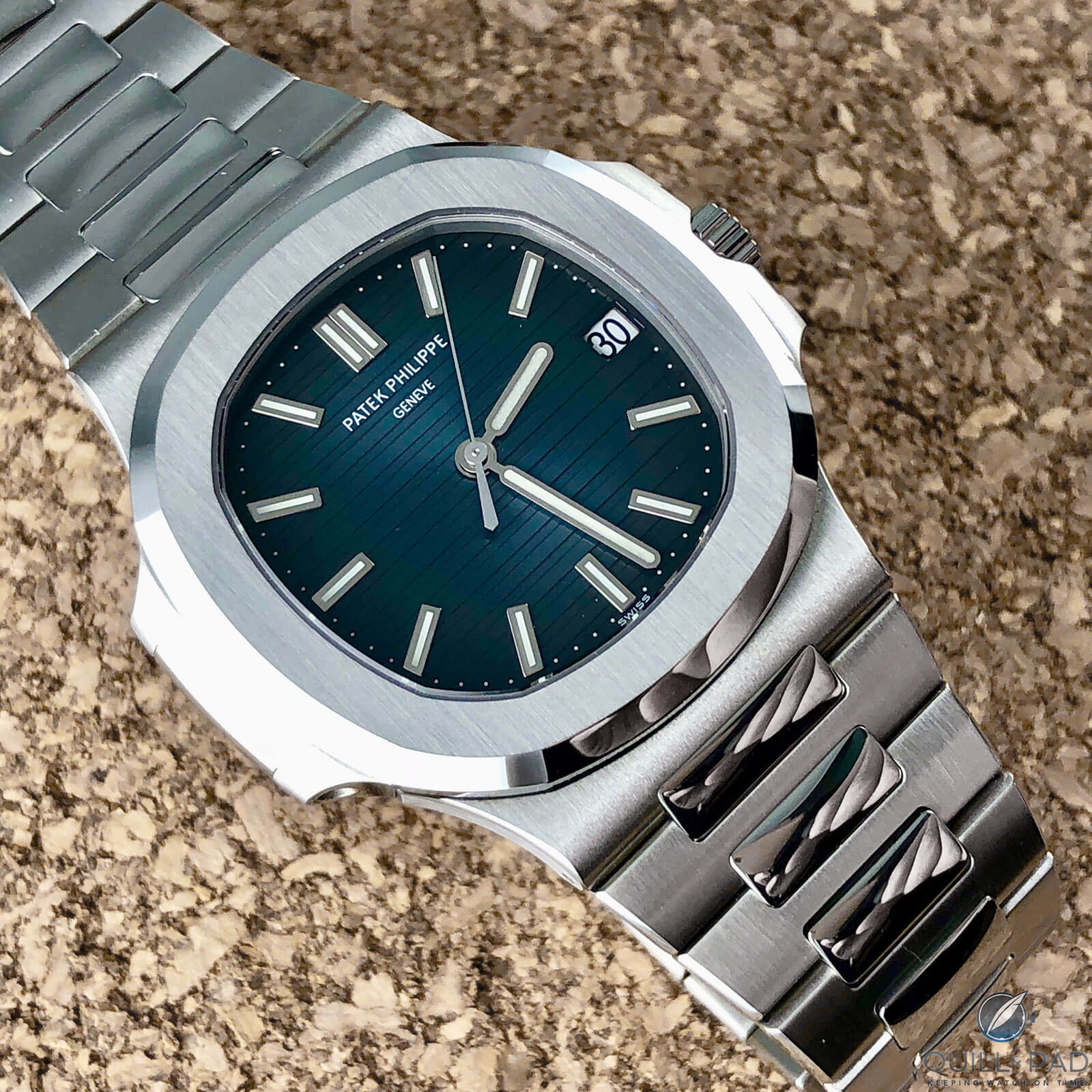
Patek Philippe Reference 5711-1A Nautilus (photo courtesy Tim Mosso)
What the other two holy trinity brands and a few select others offer
The water resistance of Audemars Piguet’s Royal Oaks are rated to a mere 50 m, with a screw-down crown on Reference 15202 and without one on the three-handed variants.
Many debates have arisen over the interpretation of water-resistance ratings, and while some claim that 50 meters with a screw-down crown is sufficient for swimming, I am reluctant to submerge any luxury watch with less than 100 m water resistance.
In any case, the models with a screw-down crown are about a centimeter thick. And while the 15202 is a delightful 8.1 mm thick, no one would advise you get it too wet.
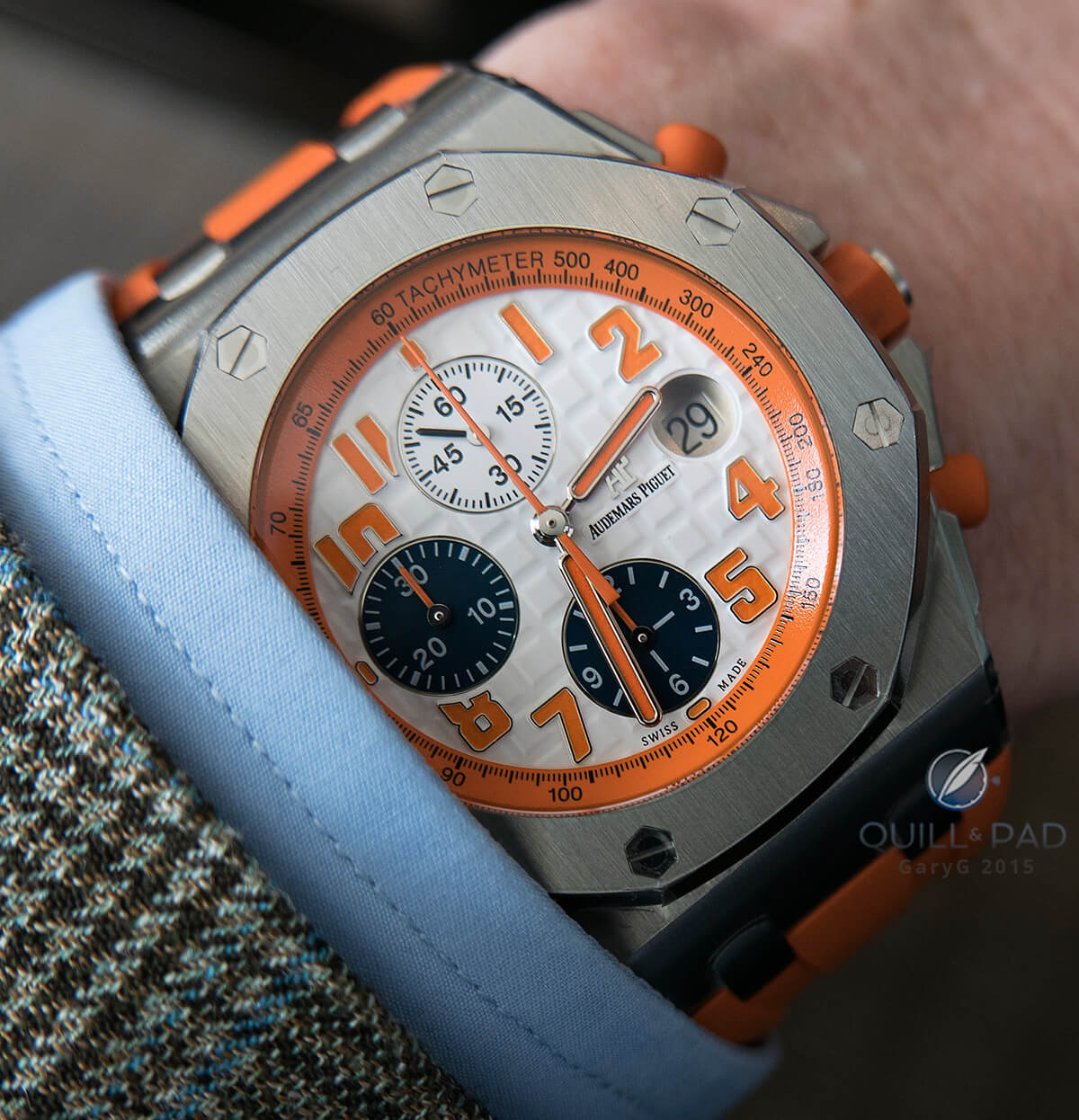
Audemars Piguet Royal Oak Offshore in stainless steel in a limited edition of 48 pieces
And the Royal Oak Offshores? Sure, they’re water resistant. But whether Chronograph or Diver, they have all the thinness and finesse of a Big Mac.
Vacheron Constantin’s second-generation time-only Overseas is a fine candidate; with a depth rating of 150 meters and a reasonable case thickness of only 9.7 mm, my main gripe was its lack of an exhibition case back (I also felt the hands were a tad too short).
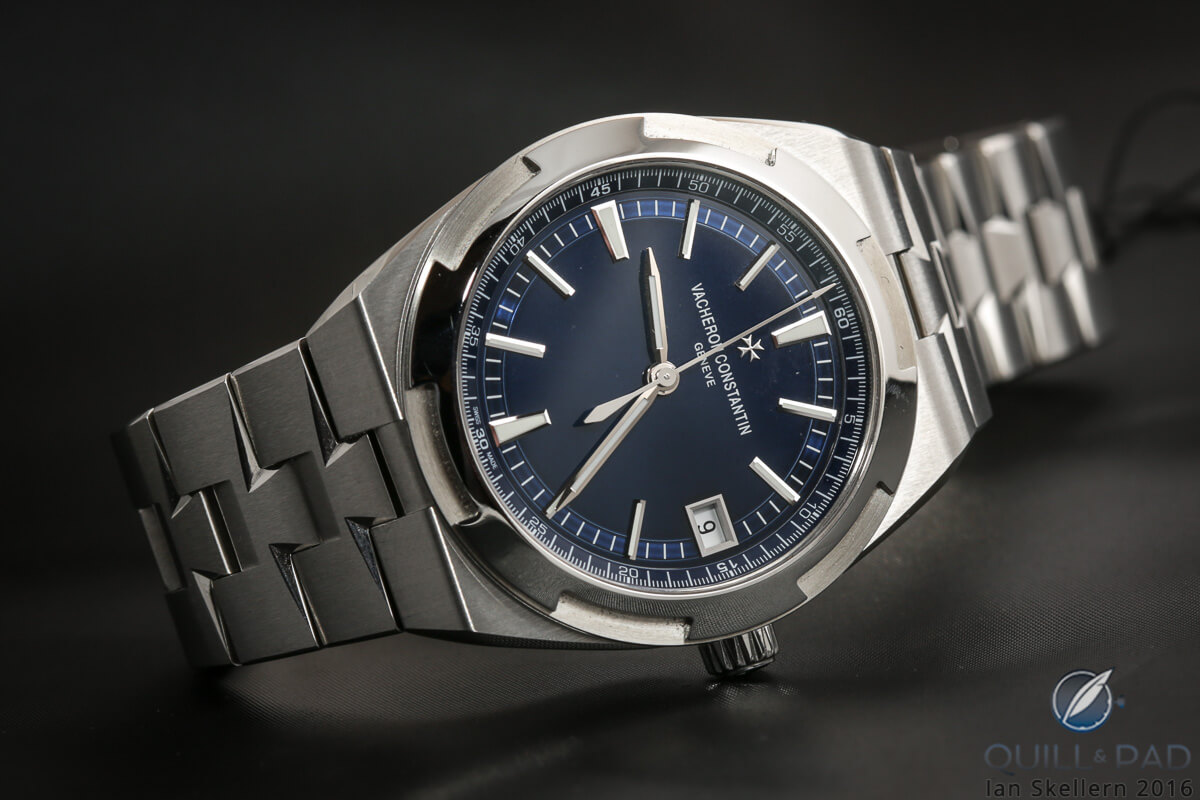
Third-generation Vacheron Constantin Overseas of 2016
Vacheron Constantin added just such a case back to the third generation of the Overseas in 2016 – all the better to show off the new in-house 5100 caliber – but at the expense of adding nearly 2 mm to the case height. At more than 11 mm thick, it doesn’t appear at all sleek.
What about the white gold ultra-thin Overseas Perpetual Calendar? Oh, if ever there was a delicious watch to behold. Sadly, it achieves its clean design by doing away with a date window and second hand, and its 7.5 mm thin profile is accomplished at the expense of water resistance, down from 150 to 50 meters.
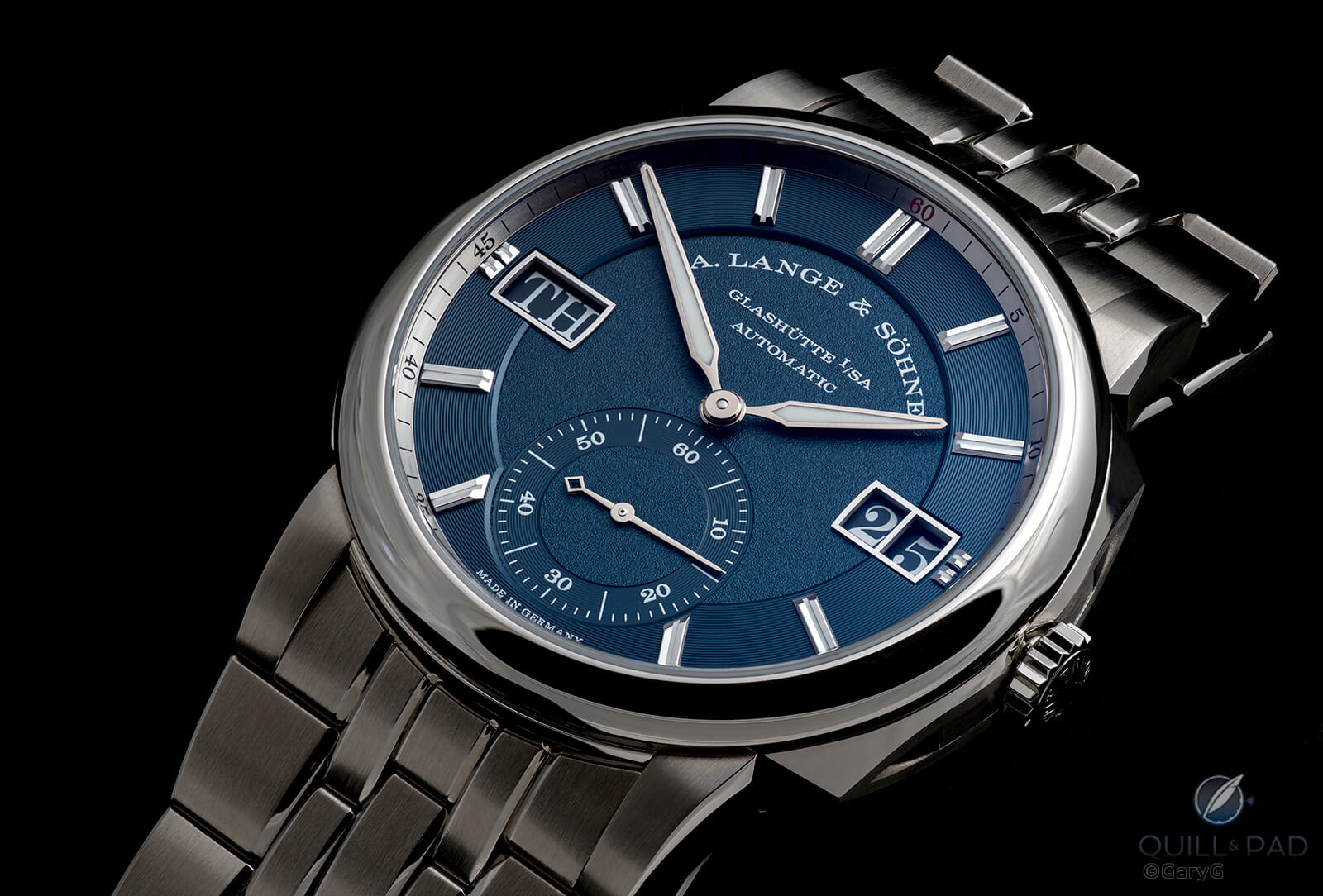
Odysseus in steel from A. Lange & Söhne
The A. Lange & Söhne Odysseus, Breguet Marine, and Glashütte Original Seventies all exceed 11 mm in height as is prone to happen with a big date complication (interesting enough, the new Marine did away with the big date but didn’t get any thinner).
Jaeger-LeCoultre’s sports watches tend to have a solid case back and are usually far from thin, as is the case, of course, with Rolex (surely to be expected with a base movement 6 mm in height). Omega’s current offerings are housed in cases with sapphire crystal case backs, but I find the Co-Axial escapements tend to render the timepieces with the dimensions of a small hockey puck.
Other contenders
A couple of unusual suspects come to mind. Piaget’s Polo S and Girard-Perregaux’s Laureato are both rated to 100 meters and come in at just under a centimeter in height. Prima facia this sounds good but, alas, these fine timepieces only deliver further proof that numbers aren’t everything.
In addition to being among those who find the designs of these pieces derivative, they just don’t feel all that thin to me.
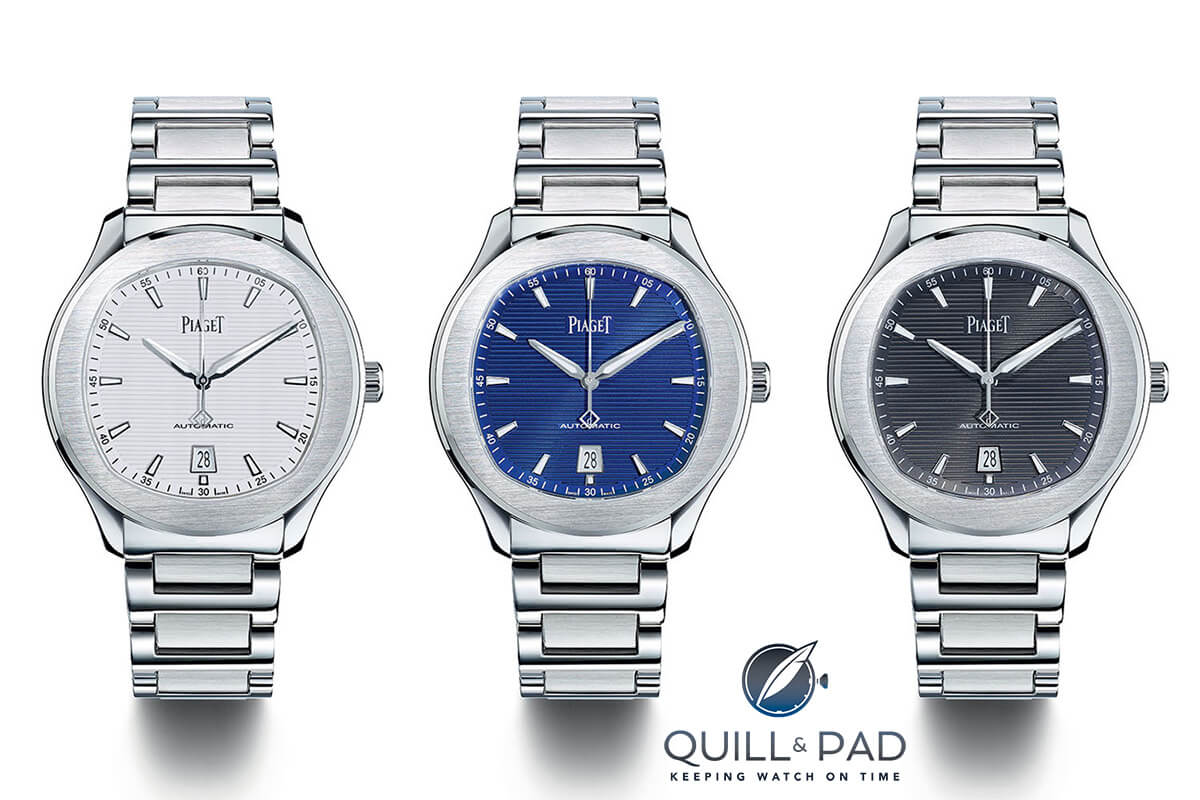
Piaget Polo S
Other noteworthy models, albeit discontinued, are Omega’s Constellation Double Eagle with the 2500 caliber. It’s still (or, rather, already) Co-Axial, you get a sapphire crystal case back and 100 m of water resistance, but unlike Omega’s current offerings it comes in under 10 mm in height.
Another is Blancpain’s Leman Aqualung (the limited edition of 1999 pieces, not the one with the grand date, mind you), quite fetching in my opinion.
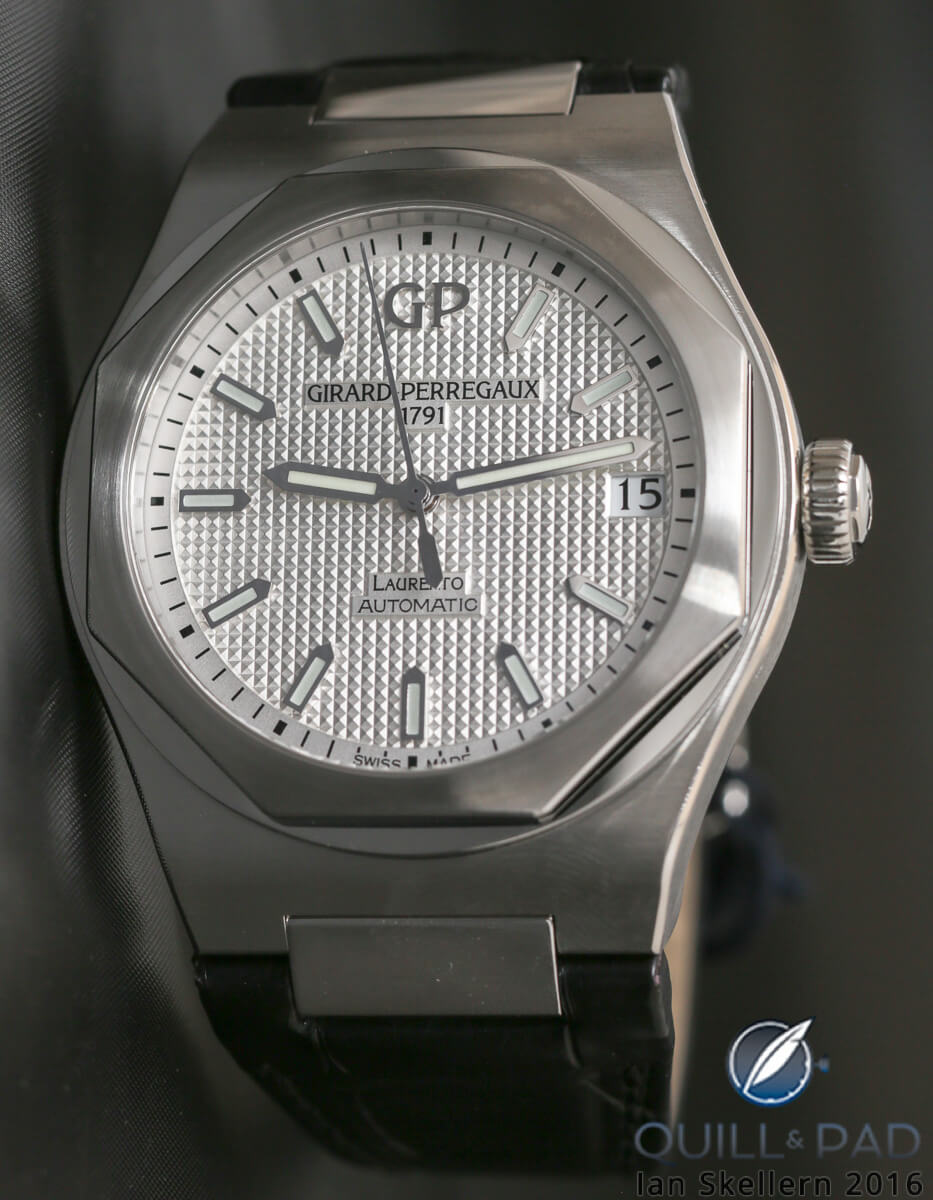
Girard-Perregaux Laureato
Lastly, a watch I personally own and highly recommend if you can find one: the Nomos Tangente Sport Datum 531. Similar to the recent Hodinkee limited edition, the 531 is powered by Nomos Glashütte’s Beta caliber so it does have a date window in addition to an exhibition case back.
It’s rated to 100 m without a screw-down crown (good thing, too, as it’s a manual wind) and is roughly 8 mm thick (roughly because Nomos claims a thickness of 7.9 mm with the exhibition case back, whereas my own Vernier caliper yielded a result closer to 8.1 mm.)
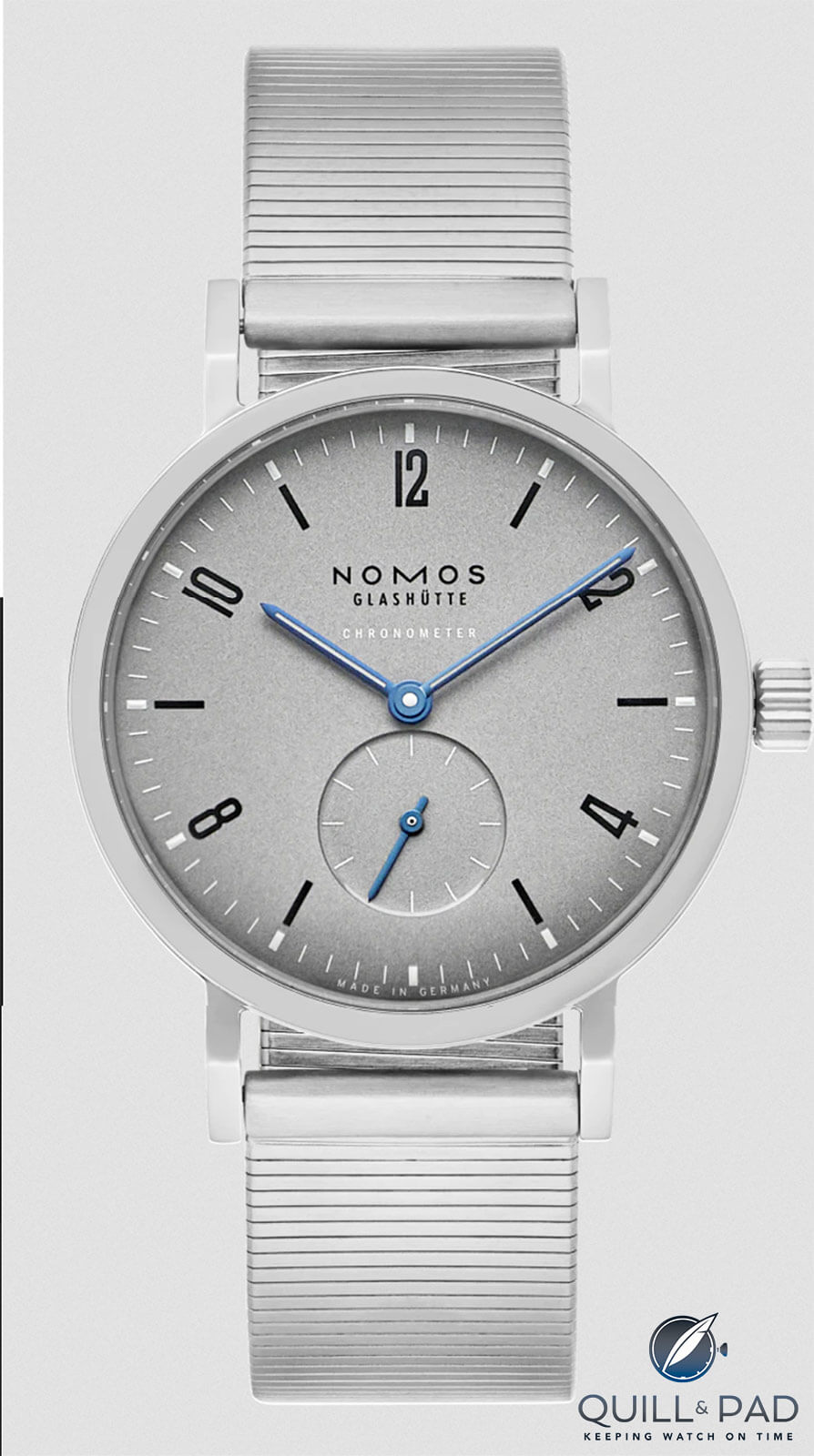
Nomos Glashütte Tangente Sport Hodinkee Edition
While it might have beat the Patek Philippe Nautilus insofar as the numbers go, the Nomos Glashütte Sport Datum doesn’t seem as thin due to its case being smaller (36.5 mm in diameter) and not as elaborate. Nonetheless, it was my choice for a luxury sports watch, though, arguably, without the luxury price tag.
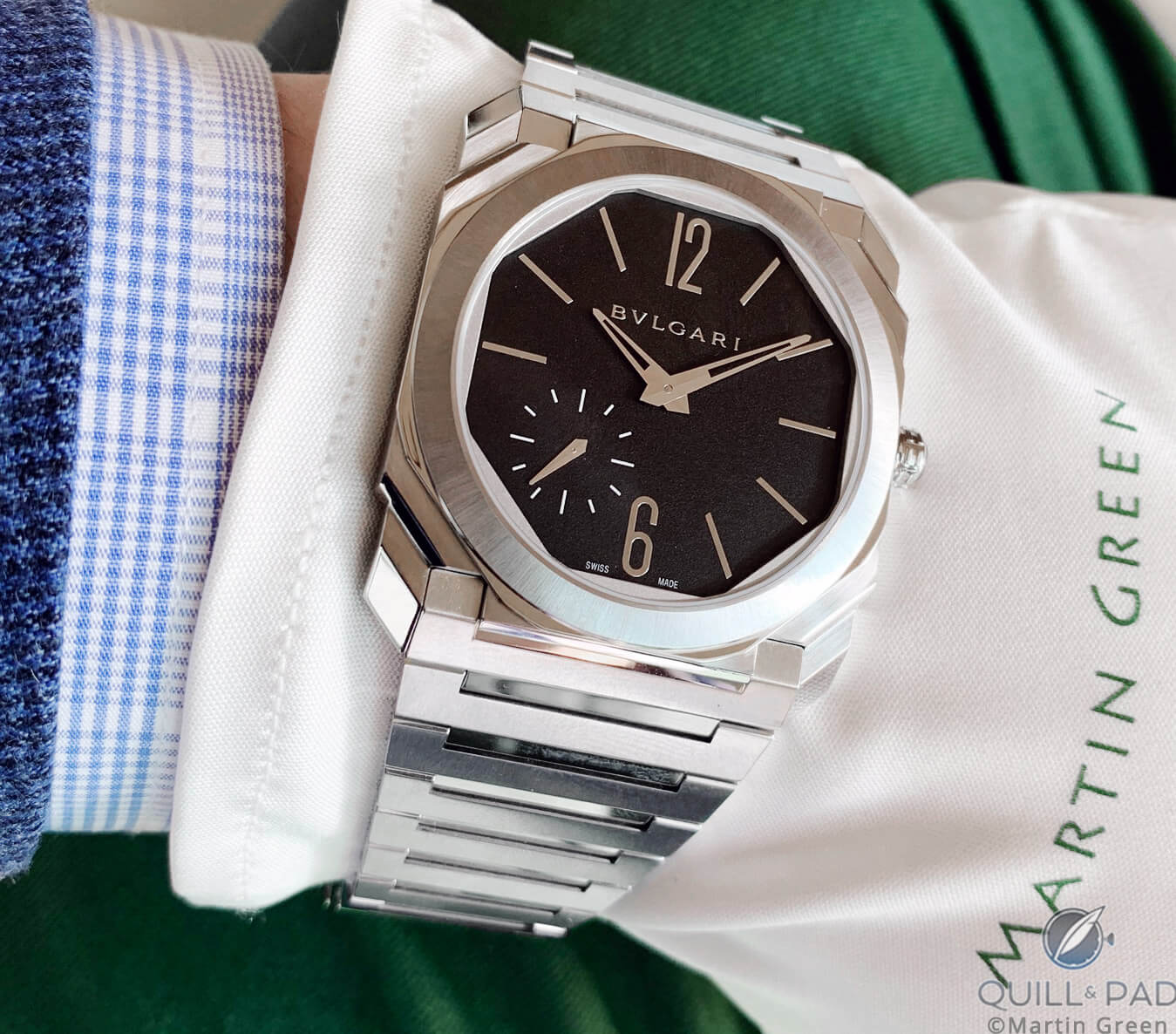
Bulgari Octo Finissimo Automatic in steel on the wrist
Finally, we come to what just might be my watch of the year: Bulgari’s Octo Finissimo 100 m satin-polished stainless steel. As the name suggests, this Bulgari is sufficiently water resistant and only 5.25 mm thick. More than thin enough in my book.
So, is it a Nautilus killer? Not really.
Patek Philippe Nautilus or Bulgari Octo Finissimo?
Personally, and in contrast to the Purists/Hodinkee point of view, I feel that a date window is rather apropos on a luxury sports watch (it’s a useful function on a daily wearer) as is a second hand – preferably a central second hand, which is easier to notice.
But most of all, I believe a sports watch ought to be lumed. The Bulgari Octo Finissimo isn’t. No doubt this is in order to preserve the integrity of the design, and I respect that. All of which is to say that, while I likes me some lume, I find the Octo Finissimo compelling enough that it just might be my next purchase.
The presence of lume, a date window, central seconds, and an additional 20 m of water resistance means that I still prefer a Nautilus. But supply, demand, and the market mean that a Patek Philippe Reference 5711 with my name on it will take quite some time.

Giant Patek Philippe Nautilus drawing by Simon Beck on Brean beach in Somerset, England
Nonetheless, I hope that in these few words I have, to some degree, illuminated a few aspects as to why I think Patek Philippe’s Nautilus Reference 5711 is so successful and desirable.
For more information on this model, please visit www.patek.com/en/collection/nautilus/5711-1A-010.
Quick Facts Patek Philippe Nautilus Reference 5711
Case: 40 x 8.3 mm, stainless steel or pink gold
Movement: automatic Caliber 26-330 S C; 28,800 vph/4 Hz, 35-45-hour power reserve, Spiromax balance spring, Gyromax balance, Patek Philippe Seal
Functions: hours, minutes, seconds; date
Price (discontinued in 2021): CHF 27,000 retail, now selling for more that $100,00 on the secondary market
Quick Facts Bulgari Octo Finissimo Automatic
Case: 40 x 5.25 mm, stainless steel or pink gold
Movement: ultra-slim automatic Caliber BVL 138, 2.23 mm height, 36.6 mm diameter, 21,600 vph/3 Hz frequency, 60-hour power reserve
Functions: hours, minutes, seconds
Price: 15,000 euros with bracelet
You may also enjoy:
Stainless Steel Patek Philippe Nautilus Market Madness: Thoughts On The Current Market Situation
From Zeros To Heroes: The Patek Philippe Nautilus 5711/1P And 5976/1G Anniversary Watches
Gérald Genta: Legendary Watch Designer With A Renegade Spirit
Giant Patek Philippe Nautilus By Artist Simon Beck In The Sand On British Beach
Leave a Reply
Want to join the discussion?Feel free to contribute!



But the Patek is only 30 meter waterproof. Does not instill much faith in their product for daily use, yet good for not-under-warranty repair profits. Have you considered a Czapek, H. Moser,,. or stick with a reliable 100 meter waterproof Rolex.
The Nautilus used to be water resistant to 100 meters Steven, I was surprised when they recently dropped them all down to 30 meters.
How boring. And what, exactly, is 100,00?
Designed by Gérald Genta, the Nautilus features a rounded octagonal bezel inspired by ship portholes, giving it a distinctive and elegant look